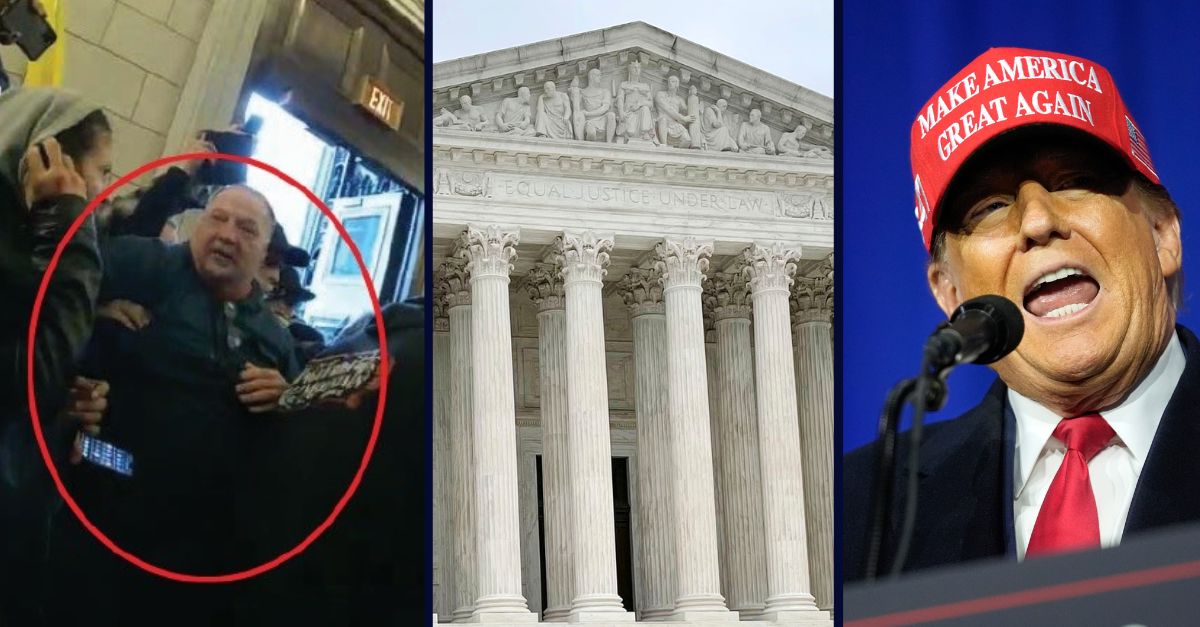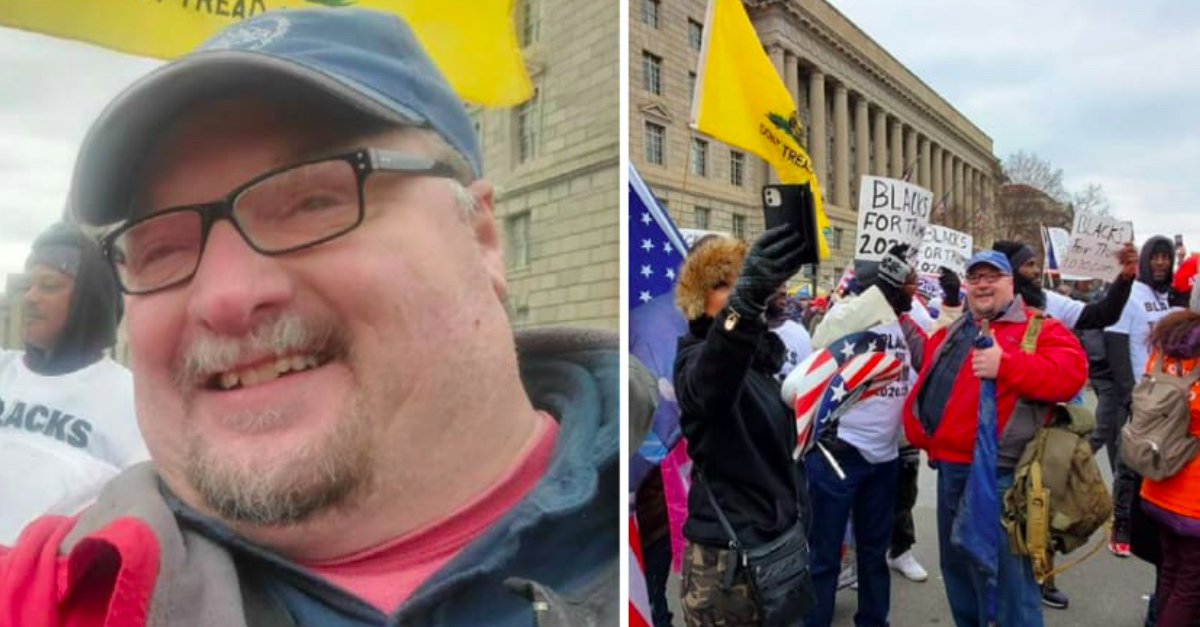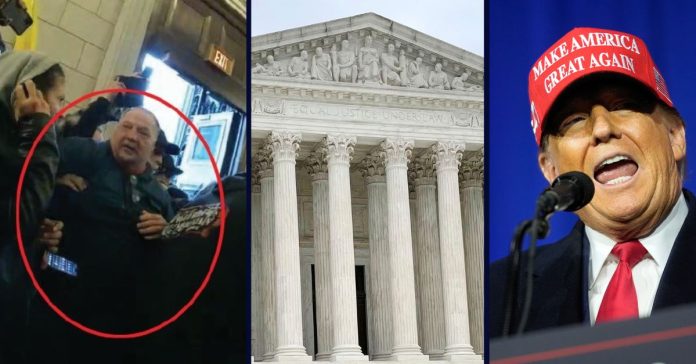
Left: Justice Department exhibit depicts accused Jan. 6 rioter Joseph Fischer./Center: U.S. Supreme Court. zz/STRF/STAR MAX/IPx 202./Right: Donald Trump. Republican presidential candidate former President Donald Trump speaks at a campaign rally in Waterford Township, Mich., Saturday, Feb. 17, 2024. (AP Photo/Paul Sancya)
The applicability of a federal criminal charge shared by Donald Trump and hundreds of accused and convicted Jan. 6 rioters will soon be argued before the U.S. Supreme Court and no matter how justices fall on the issue, the decision will have far-reaching consequences.
In a release of the high court’s calendar reviewed by Law&Crime on Monday, the justices have agreed to hear arguments in Fischer v. United States on April 16. Notably, there are no other arguments slated for that date. Typically the court will hear two cases in a single session, giving one hour per case with attorneys on each side allotted 30 minutes to present and field questions rapid-fire. That Fischer v. United States is slated alone is telling: it will be a gnarled legal debate.
The Supreme Court first agreed to hear Joseph Fischer’s case in December. The former Pennsylvania police officer was arrested in February 2021 and charged with obstruction of law enforcement during civil disorder, knowingly entering or remaining in any restricted building or grounds without lawful authority, violent entry, and disorderly conduct on Capitol grounds and obstruction of justice/Congress.

Court exhibits depict Joseph Fischer on Jan. 6, 2021
Prosecutors said video footage showed Fischer screaming “Charge!” as he hauled off toward police officers at the Capitol on Jan. 6 and then had an altercation with at least one of those officers.
The most serious charge was the obstruction charge, known in the federal code as 18 U.S.C. § 1512(c)(2).
The federal statute states that “whoever corruptly alters, destroys, mutilates or conceals a record, document or other object, or attempts to do so, with the intent to impair the object’s integrity or availability for use in an official proceeding; otherwise obstructs, influences, or impedes any official proceeding or attempts to do so, shall be fined under this title or imprisoned not more than 20 years, or both.”
Key in that statute is the word “corruptly.”
Fischer was inside the Capitol briefly and recorded himself charging toward a line of police officers while appearing to shout “hold the line” and “motherf——,” court records show. His phone captured him having a “physical encounter with at least one police officer,” records also state.
Text messages he allegedly shared on Facebook a day after the Capitol assault depicted him proudly boasting to friends that he had “no regrets” and gave “zero s—-” about being at the Capitol. He also allegedly boasted of taking on pepper spray and pepper balls and making it to “level two” of the Capitol as he muscled past police lines.
But since being charged, Fischer has questioned whether 18 U.S.C. § 1512(c)(2) was the appropriate statute to use against him and has asked the high court to consider whether the lower D.C. Circuit incorrectly interpreted it. In his estimation, the provision applied more to a defendant taking some action with respect to a record or a document. The law was crafted in 2002 in an effort to tamp down on financial crimes, Fischer argued.
The Trump-appointed federal judge overseeing Fischer’s federal case in Washington, D.C., U.S. District Judge Carl Nichols, agreed with the defendant and dismissed the count. The lower court’s ruling was eventually overturned by the U.S. Court of Appeals 2-1, prompting Fischer to appeal to the Supreme Court.
While appeals court judges Justin Walker and Florence Pan found the statute applied to congressional proceedings as well as documents, many Jan. 6 defense attorneys, including those who represented defendants in the seditious conspiracy trials of the Proud Boys and Oath Keepers, have routinely balked at the obstruction charge.
They contend it was used by prosecutors as an overly broad catchall and that proving whether a rioter had “corrupt” intent is a bridge too far because it would also mean that prosecutors have to prove that a defendant knew they weren’t just obstructing the certification in the general protest sense but doing so because they believed their protest was to stop a stolen election.
When the case was first up for consideration to the Supreme Court, prosecutors argued that the corruption element was proven in Fischer’s conduct on Jan. 6 because his conduct actively prevented government officials from “accessing and counting the certificates of electoral votes as the Electoral Count Act requires.”
In Washington, D.C., Donald Trump faces four criminal charges alleging he criminally conspired to overturn the results of the 2020 election and two of those charges find their roots in 18 U.S.C. § 1512(c)(2).
Specifically, Trump was charged with conspiracy to defraud the United States; conspiracy to obstruct an official proceeding; obstruction of an attempt to obstruct an official proceeding; and finally, conspiracy against rights.
If the Supreme Court issues a ruling that interprets the statute as Fischer says it should be interpreted, it would have the potential to upend at least two of the four charges brought against Trump by special counsel Jack Smith. It would hobble the case in myriad ways but chief among them, it would be harder for Smith to argue that Trump’s obstruction and the violence at the Capitol went hand-in-hand.
According to the Justice Department, at least 300 Jan. 6 defendants have been charged with the obstruction statute.
Have a tip we should know? [email protected]

